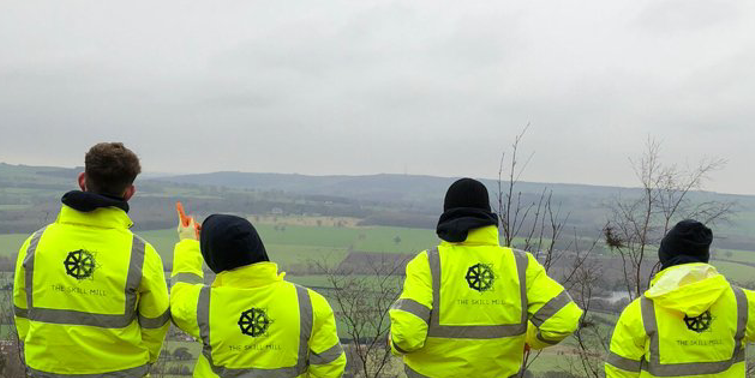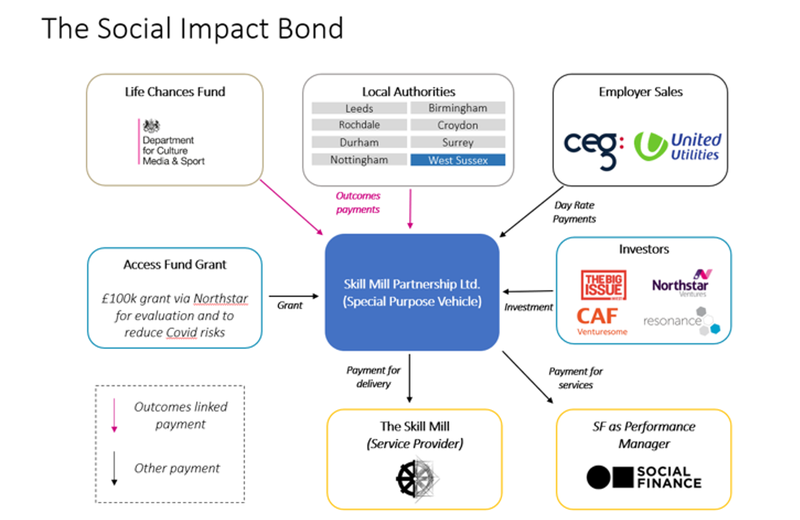
- Impact bond
- Child and family welfare
- Criminal justice
- Employment and training
- UK
United Kingdom
6 mins
The Skill Mill
Last updated: 23 May 2023
The Skill Mill is a social enterprise which employs young ex-offenders, working on environmental projects across the UK.
Project Location
Aligned SDGs


INDIGO Key facts and figures
-
INDIGO project
-
Commissioner
-
Intermediary
-
Investor
-
Provider
-
Funds
-
Launch date
June 2020
-
Start of service provision
August 2020
-
Duration
4 years
-
Capital raised (minimum)
GBP 1m
(USD 1.32m)
-
Service users
242
Target population
High risk ex-offenders aged 16-18
The problem
While the number of youth offenders and their reoffending rate has seen a large decrease over the last decade, more than 1 out of 3 young offenders commit reoffences in England and Wales (Youth Justice Board for England and Wales, 2022). Historically, the youth reoffending rate has been higher than adults. In particular, 71% of juvenile offenders who commit more than 11 offences are found to reoffend within a year (Ministry of Justice, 2022).
Given the stigma attached to their criminal records, young offenders often struggle to access education, training, and employment opportunities and risk being socially excluded. Recidivism not only compromises community safety, but also poses complex challenges to local authorities, as their reintegration to society and economy requires tailored and integrated support.
The solution
The Skill Mill programme has been launched to aid young people break the cycle of reoffending against this backdrop of high juvenile recidivism. Built on the team’s two- decades-long experience as criminal justice practitioners, the Skill Mill offers young offenders 6 months paid work placements in environmental maintenance within local communities.
During this placement, participants can also gain nationally recognised qualifications (AQA Employability Skills level 2) and other practical skills, assisting their journey towards reintegration to the labour market and society. Their skill development is further supported by tailored mentoring and counselling. Upon completion of the placement, participants are encouraged to pursue further employment opportunities in local partner organisations and the wider job market.
The Skill Mill’s approach is underpinned by academic research investigating ‘what works’ to reduce reoffending (Long et al., 2019). In particular, criminological research suggests that the type of jobs matters. For instance, high-quality jobs that are conducive to civic engagement may contribute to reduction in delinquency (Long et al., 2019).
The Skill Mill began exploring opportunities for scaling the programme in new areas in 2019, and introduced a social impact bond (partially funded by the Life Chances Fund) to deliver their services in 8 locations over 4 years in 2020. The income generated consists of outcomes payment (2/3) and revenues from local clients for completing outdoor work (1/3).

The impact
Outcome payment framework
The payment is linked to the achievement of the following 6 outcomes:
- Preventing Reoffending: Confirmation from Police or another local agency with access to the Police National Computer that Service User has not been reconvicted during this period; or confirmation from the YOT (Youth Offending Team).
- Employment and Further Education: Letter from employer confirming full or part time employment for Service User; or confirmation from HMT that Service User has registered as employed; or evidence of enrolment into a NVQ Level 2 or above training course
- Programme Registration: Young person registers for the Skill Mill programme by signing the registration form
- Programme Completion: Service User has completed at least four weeks on the programme with regular attendance of at least 75% as evidenced by daily attendance register.
- Qualification: Confirmation from AQA that Level 2 award has been achieved.
- Attendance Service User has completed the Skill Mill programme with regular attendance of at least 75%, or completes 5 months of the programme, but departs for purposes of entry into a job position.
Reoffending rate outcome will be compared with the figures published by the Ministry of Justice in the UK. In addition to the outcomes linked to payment, other associated outcomes that do not trigger payment are also measured. The figure below shows the mechanisms through which the Skill Mill programme seeks to generate multiple benefits in the community including environmental and economic benefits.
Evaluation of the programme prior to the launch of this SIB has demonstrated that the participants averaged fewer and less severe offences compared to a cohort who has not participated in the programme (Long et al., 2019). In 8 years, 274 young people participated in this programme and 20 participants have been reconvicted, offering the Social Return on Investment (SROI) of approximately 12:1.
Timeline
-
June 2020
Outcomes Contract signed
-
August 2020
Start date of service provision
-
November 2024
Anticipated end date of service provision
Project insights
Community acceptance is critical for SIBs in the criminal justice field
Referrals to existing services and support for youth offenders is often inadequate at preventing reoffending. David Parks, the Founder and Managing Director of The Skill Mill, says, 'our primary aim is to create employment for the young people to re-engage positively with society.' Providing young people with suitable employment opportunities to contribute to the local community can be a way to actively build community acceptance. As Parks and White note, ‘all of us – young people, supervisors, residents and businesses – gain a better appreciation of the other and the positives that result from giving something back to the community' (Parks and White, 2016). In effect, the programme creates a psychological contract for achieving the common goal of ‘social integration of young offenders’ between relevant stakeholders.
Research findings in criminology suggest that having community ties, fulfilling employment, recognition of their value by others, and a sense of meaning and purpose in life all contribute to reducing the likelihood of reoffending (Maruna and Mann, 2019). In practice, however, job opportunities for high-risk offenders can be limited unless there are well-functioning local networks within a community, committed to supporting their transition into employment. While community acceptance is elusive and difficult to quantify, job attainment can be a proxy metric that reflects the extent to which it has been achieved.
Outcomes achievement can be a “certificate of rehabilitation” to facilitate the development of community partnerships
Bringing investors and local employers on board with offender rehabilitation practices can be time-consuming. One of the reasons is psychological reluctance in the community, generated through stigma and labelling of ‘offenders’. For instance, some may worry that hiring delinquents can be cumbersome. This is despite the fact that many people who have met them in person indicate that they have a positive impression of them. As a result, criminal justice specialist organisations are heavily reliant on government grants to provide rehabilitation services. Without efforts designed to address the offender label and stigma, delinquents may continue to lead lives that are disconnected from mainstream communities, unable to gain positive acceptance for their new non-offending identity (Best and Savic, 2015).
In this context, achievement of outcomes defined in the SIBs within the criminal justice field can be considered a 'certificate of rehabilitation' to recognise offenders' efforts towards change. Through employment and community service, the Skill Mill programme reaffirms participants of their non-offending identity. Contributing to the local community through valued environmental work can boost young people's confidence and their sense of belonging to the community. The programme is also valuable to local communities, as it promotes job creation in the green economy through environmental work, while also enhancing community cohesion and resilience. By establishing an overarching vision for encouraging social integration of young people excluded from the labour market and defining outcome metrics that capture partners' diverse needs, the SIB has the potential to facilitate the development of community partnerships.
There is a need to consider indicators other than reoffending rate and adjust the programme to local contexts
As the early terminations of SIBs in the criminal justice filed in the US and Australia suggest, reducing reoffending is extremely complex, not least because the effectiveness of the rehabilitation programmes can depend on individuals’ motivation to change their own life trajectories. Furthermore, criminological research findings suggest that the effectiveness of interventions is highly context-dependent (Hough, 2010). This is particularly the case for community-based programmes - what works in one region at a given time may not work well in another context. These challenges, combined with the general lack of familiarity with initiatives within the criminal justice field and the mixed success of previous initiatives, may contribute to risk aversion among social investors and other stakeholders alike. When liaison with existing statutory services is crucial for service delivery, as was the case for the Skill Mill SIB, partnerships will need to be developed region by region. Skill Mill programme has been designed on a bottom-up basis, based on David and his team’s nearly 20 years’ experience as criminal justice practitioners.
While the reoffending rate may be the obvious choice for an outcome metric in the criminal justice field, the context-dependent nature of rehabilitation programmes necessitates other outcomes metrics to be considered. Rather than solely targeting reduction in reoffending, the Skill Mill leverages the SIB framework to bring private actors into a local collaborative network by incorporating other metrics including community acceptance (using proxy metrics such as attainment of employment and qualification). Such an approach has also been adapted by Portugal's Breaking Bars Farm SIB (a year-long SIB job training programme for inmates), in which the integration into the labour market is the only positive outcome indicator. This approach may be more practical than using the reoffending rate as the only outcome metric.
Contact details
For further information on the Skill Mill, you can contact:
- David Parks, Founder and Managing Director, david.parks@theskillmill.org
- Reiji Ikeda, Offender Rehabilitation Supports Manager, Tokyo Probation Office, Ministry of Justice of Japan r.ikeda.9t3@i.moj.go.jp
The case study was compiled by Reiji Ikeda and Yuko Ishibashi with support from David Parks, September 2022
Downloads and Resources
Youth Justice Statistics 2020/21
Download PDFProven reoffending statistics: January to March 2020
Download PDFDo Flood Mitigation and Natural Habitat Protection Employment Reduce Youth Offending?
Download PDFYouth employment in Australia A comparative analysis of labour force participation by age group
Download PDFReconciling ‘Desistance’ and ‘What Works’
Download PDFRisk and Desistance: A Blended Approach to Risk Management
Download PDF